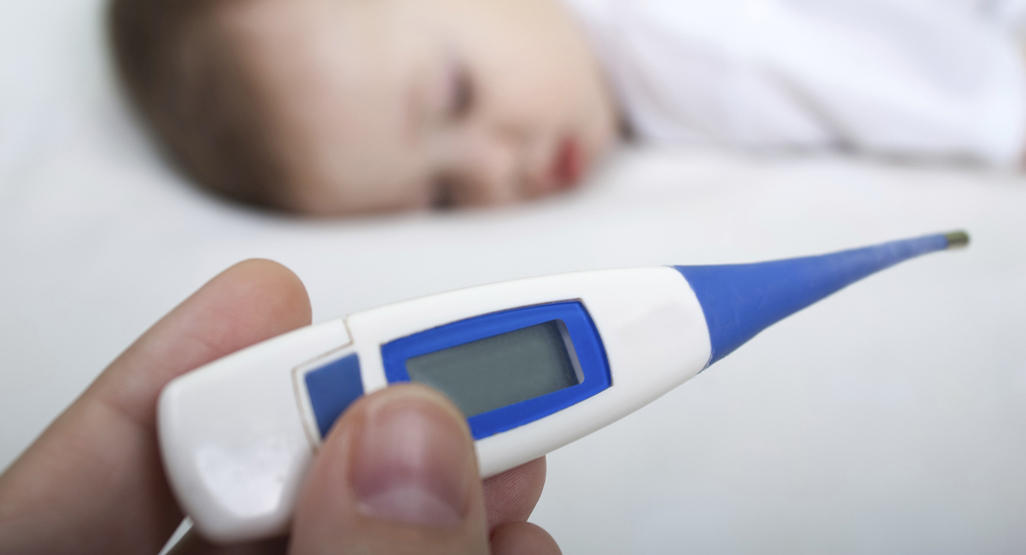Babies are especially prone to elevated temperature in the presence of illnesses, including the cold and flu. A baby can have a high temperature and not be sick if you over-dress them and cause the body temperature to rise. Fever is a completely natural reaction to illness and high temperature in babies is the body’s way of fighting off the infection. Most infections can be managed at home; however, if you have a newborn that exhibits a rectal temperature of higher than 100.4°F (38°C), you should contact your baby’s healthcare practitioner for further evaluation and treatment.
What Are Considered Fever and High Temperature in Babies?

If you suspect that your baby has a fever as evidenced by having red cheeks and warm skin, you should take your baby’s temperature, preferably rectally as it yields the most accurate results.Any temperature in a baby that ranges from 97°F (36.1°C) to 100.3°F (37.9°C) is considered to be within the normal range. Rectal temperatures of greater than 100.4°F (38°C) is considered to be a fever and may indicate a need for medical attention.
Babies have different ranges of rectal temperature depending on their age. You should contact a physician if:
- Newborns and babies less than the age of 3 months with a rectal temperature of 101°F (38°C) or more.
- Infants between the ages of 3-6 months who have a rectal temperature of greater than 102°F (39°C).
- Babies older than 6 months of age who have a rectal temperature in the range of 104-105°F (40°C).
- Your baby has other symptoms beyond an elevated temperature.
- The baby’s fever persists in spite of being given a fever-reducing medication.
What Causes Fever and High Temperature in Babies?
Babies can develop a high temperature for a number of reasons. Most cases will resolve with the use of fever-reducing medications. If the high temperature is unresponsive to treatment or lasts longer than just a few days, there could be a more serious cause that needs to be investigated by the doctor.
- The most common cause of high temperature in babies is some kind of infection.The baby’s body responds to the infection by raising its temperature. Bacteria and viruses can be killed by elevated body temperatures. Viral infections are by far the most common cause of high temperature in babies. These infections are usually the result of the cold or flu virus—both self-limited conditions that require no treatment.
- Other fevers can be caused by bacteria. It is harder to get rid of bacterial infections spontaneously and antibiotic treatment is often necessary. A common bacterial infection causing fever in babies is an ear infection, although you cannot rule out more serious cases, such as UTIs, sepsis, meningitis, and pneumonia.
- Rarer causes of fever in children include drug reactions, allergies, certain joint diseases, vaccine reactions, and diseases of the digestive tract.
When Should I Take My Baby to the Doctor?
Under certain conditions, fever can be serious and means a trip to the doctor’s office in order to manage the underlying illness. Such indicators include:
- A lack of willingness to eat or drink for 8 hours or more.
- The baby refuses to drink more than half of the expected amount of fluids over a 24 hour period of time.
- The baby’s soft spots on her head are sunken when touched. This can mean that the baby has become dehydrated and may need intravenous fluid resuscitation.
- The baby has a rash along with their fever.
- The baby is younger than 3 months of age.
- The baby is lethargic, weak or pale.
- The baby is having difficulty breathing
- The baby acts as if he/she has a headache, stiff neck or is sensitive to light.
- The baby is excessively vomiting or has intractable diarrhea
- The fever lasts longer than 48 hours.
- The baby seems to be in some sort of pain.
How Should I Take Care of Babies with Fever and High Temperature?
High temperature in babies is something to be concerned about. Ways you can manage your baby’s fever include:
- Put your child in lukewarm bath water. Make sure the water is not too cold or this will chill the baby. Keep the baby in the lukewarm bath water for about 15 minutes to bring down the temperature.
- Undress your baby. Sometimes, bundling the baby in too many blankets or heavy clothing can exacerbate a fever.
- Provide the baby with plenty of sources of liquid. You can choose whatever the child usually drinks or juice that has been diluted with water. This helps prevent dehydration.
- Use a light blanket or sheet to cover your baby. This will dissipate the fever faster than if you use heavy blankets.
- Adjust the room temperature so that it is cooler for the baby.
- Give the baby Tylenol or paracetamol drops. These are effective relievers of fever and pain in children with febrile illnesses. Read the package labelling or talk to your doctor about the correct dosage, which is usually based on the weight of the baby.
